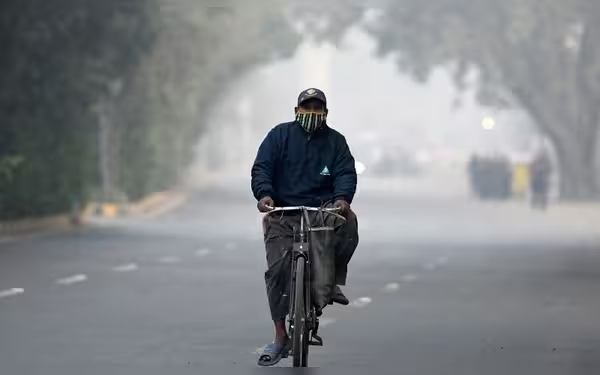Sunday, December 22, 2024 02:17 PM
Health Crisis: 70% Of Pakistanis Affected By Smog-Related Issues
- Seven out of ten Pakistanis face health issues from smog.
- Common symptoms include cough, flu, and breathing difficulties.
- Public awareness is rising regarding air quality impacts.
 Image Credits: dawn.com
Image Credits: dawn.comA survey reveals that 70% of Pakistanis are suffering health issues due to smog, highlighting the urgent need for action against air pollution.
In recent years, Pakistan has been grappling with severe air pollution, particularly during the winter months when smog blankets major cities. This environmental crisis has not only affected visibility but has also taken a toll on the health of millions of citizens. A recent survey conducted by the international insights firm Ipsos reveals alarming statistics: about seven out of ten Pakistanis are currently facing health issues due to smog. The most common symptoms reported include cough, flu, and breathing difficulties, which are becoming increasingly prevalent among the population.
The survey highlights a growing concern among the public regarding the impact of air quality on their health. As smog continues to envelop urban areas, many individuals are experiencing discomfort and health complications that can lead to more serious conditions if left unaddressed. The findings indicate that eight out of ten respondents believe they have a role to play in combating this pressing issue. This collective acknowledgment suggests a rising awareness of environmental responsibilities among citizens.
It is crucial to understand that smog is not just a seasonal nuisance; it poses significant risks to public health. Children, the elderly, and those with pre-existing health conditions are particularly vulnerable. The symptoms of cough and flu can escalate into more severe respiratory issues, making it imperative for individuals to take preventive measures. Simple actions, such as wearing masks outdoors, using air purifiers indoors, and limiting outdoor activities during high smog days, can make a difference.
Moreover, the government and local authorities must also step up their efforts to tackle air pollution. Implementing stricter regulations on emissions from vehicles and industries, promoting the use of public transport, and increasing green spaces can significantly improve air quality. Public awareness campaigns can further educate citizens on the importance of reducing pollution and protecting their health.
The findings from the Ipsos survey serve as a wake-up call for both the public and policymakers. While individual actions are essential, collective efforts are necessary to combat the smog crisis effectively. By working together, Pakistanis can not only improve their health but also contribute to a cleaner and healthier environment for future generations. It is time for everyone to take responsibility and act decisively against the smog that threatens our well-being.













